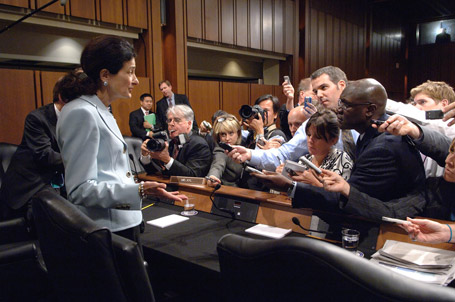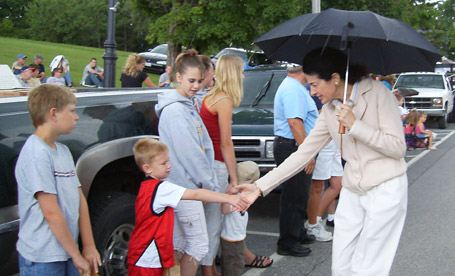 |











|
 |
|
When history calls, history calls, says Sen. Olympia Snowe on her bipartisan approach

|
  |
In 2005 she was named the 54th most powerful woman in the world by Forbes. In 2006, TIME magazine ranked her one of the top 10 U.S. senators, the only woman so recognized.
By Margarita Pournara
When first elected to Congress in 1978, at the age of 31, she was the youngest Republican woman and the first Greek-American woman, ever elected to Congress.Τhere is something about Senator Olympia Snowe from Maine that makes her a truly distinguished politician. Perhaps it's her ability to express her views freely, to stand up for what she believes, to make efforts to built a bipartisan consensus on key issues, maybe her unique way of combining political charm with Greek "leventia."
“When history calls, history calls,” she said upon being the only Republican on the Senate Finance Committee to vote for the health care reform, enabling it to pass from the committee.
Αfter Senator Paul Sarbanes’ retirement, she is the only Greek-American senator leading the fight on issues so close to our heart such as Cyprus, the Aegean, the Ecumenical Patriarchate, FYROM.

Snowe was born Olympia Jean Bouchles in Augusta, Maine, the daughter of Georgia Goranites and George John Bouchles. Her father immigrated to the United States from Sparta, Greece. She is a member of the Holy Trinity Greek Orthodox Church in Lewiston, Maine. Snowe's early life had more than its share of tragedies; her mother died of breast cancer when she was eight and her father died of heart disease barely a year later. She was raised by her aunt and uncle in Auburn, Maine; her aunt was a textile mill worker and her uncle a barber, along with their five other children. Her brother John was raised separately, by other family members. Within a few years, illness would also claim her uncle's life.
Following her mother's death, Snowe was sent to Saint Basil's Academy, a Greek Orthodox Catholic institution that cares for children in Garrison, New York, where she remained from the third grade to the ninth and was taught by Athena Hatziemmanuel. Returning to Auburn, she attended Edward Little High School, before entering the University of Maine in Oroto, in 1969, where she earned a degree in Political Science. Shortly after graduation, Bouchles, married her fiancé, Republican state legislator Peter Snowe. She then received an honorary degree from Bates College in 1998, and another from the University of Delaware in 2008.
Snowe entered politics and rose quickly, winning a seat on the Board of Voter Registration and working for Congressman (later US Senator and US Secretary of Defense) William Cohen. Tragedy struck Snowe again in 1973, when her husband was killed in an automobile accident. At the urging of family, friends, neighbors and local leaders, Snowe ran for her husband's Auburn-based seat in the Maine House of Representatives at the age of 26 and won. She was re-elected to the House in 1974, and, in 1976, won election to the Maine Senate, representing Androscoggin County. That same year, she was a delegate to both the state and national Republican conventions.
Olympia Snowe was elected to the US House of Representatives in 1978, and represented Maine's 2nd Congressional District from 1979 to 1995. She married John “Jock” McKernan, then Governor of Maine, in February 1989. Snowe and McKernan had served together in Congress from 1983 to 1986, when McKernan represented the 1st District. While Snowe was First Lady of Maine from 1989 to 1995, she also served as a U.S. Representative.
In 1994, when Senate Majority Leader George J. Mitchell declined to run for re-election, Olympia immediately declared her candidacy for the seat and she won by 60% of the votes, carrying every county in the state. Snowe was part of the Republican electoral sweep of 1994, in which Republicans captured the House and Senate for the first time since 1954. She was easily reelected in 2000 and 2006, and she is now a member of the Select Committee on Intelligence, the Committee on Commerce, Science & Transportation, the Committee on Finance and the Committee on Small Business & Entrepreneurship. In 2001 she became the first Republican woman ever to secure a full-term seat on the Senate Finance Committee.

|
|
"Those who get sick should never have to worry about how they’re paying their bills – they should be solely focused on their treatment and getting back to good health as quickly as possible" |
|
You are about to participate and be honored at the 26th Annual Cyprus and Hellenic Leadership Conference in Washington DC. Your thoughts on that?
As the first Greek-American woman elected to both the U.S. House and U.S. Senate, I have always felt there could be no greater tribute to my heritage than working on matters of vital concern and relevance to our ancestral homeland. As members of the Hellenic community, we are defined by our long and proud dedication to liberty, democracy, and human dignity. With this in mind, protecting the Ecumenical Patriarchate of Constantinople from persecution, and ending the illegal occupation of the north of Cyprus, remain as enormous imperatives that will require constructive engagement and a strong commitment from those willing to champion human rights. You can be assured that whether it’s working to help end the illegal occupation of Cyprus, or fighting to further strengthen U.S.-Greece relations, I will never stop putting my “Mediterranean tenacity” to work.
Your childhood and young adulthood were marked by personal tragedies. How have those experiences shaped your character?
What I experienced as an eight-year-old, when my mother had breast cancer, and the struggle that my parents went through, has had a profound influence on me and helps guide, and focus, my decision-making process. When my mother was sick, we were living in a small apartment in Lewiston. I was so young, but I knew we didn’t have a lot …my mother wasn’t working at this point and we didn’t have much money …no car, either, and I don’t know if we had insurance, but I can’t imagine – given our circumstances – that we did. I remember wondering what was going to happen. When you’re young, you’re not fully aware of the toll a devastating illness can take on a family. But later in life, reading letters my mother wrote to friends and relatives, it was quite obvious that it was excruciatingly painful--emotionally, physically, and financially – on my entire family. When you don’t have much, a catastrophic illness, and the financial ramifications resulting from that, it’s a horrifying prospect – and that never leaves you. That thought of desperation and fear of getting sick, or having gotten sick and not knowing how to manage the mounting medical bills, never leaves my mind. Someone who gets sick should never have to worry about how they’re paying their bills – they should be solely focused on their treatment and getting back to good health as quickly as possible.
You’ve had a distinguished political career and built a strong reputation as a moderate. You were the only Republican Senator to vote for the Democratic leadership’s health care reform last fall. You were severely criticized by some in your party for that decision.
Having been fully immersed in this issue for the entire year, and as the only Republican to vote for health reform in the Finance Committee, I deeply regret that I could not support the health care reform legislation the Senate passed in December, given my continued concerns with the measure, and (with) an artificial and arbitrary deadline of completing the bill before Christmas, which in my view, shortchanged the process on this monumental and trans-generational effort. I remain convinced we must work toward a responsible, common sense solution to reverse the trend of spiraling health care costs that will cause one-in-four Americans this year to have either inadequate coverage or none at all, and threatens affordable coverage for millions more Americans in the future. I couldn’t agree more that reform is an imperative, and I will continue my constructive efforts to forge effective, common sense health care reform as the process moves forward. The reality that the status quo is unacceptable is what originally brought six of us together on the Senate Finance Committee last summer in the only bipartisan effort in any committee of the House or Senate in the so-called Group of Six, convened by Chairman Max Baucus. We met 31 times, week after week for over four months, to debate policy and not politics. Today, we still don’t have answers to some of the most fundamental questions that people will be asking at their kitchen tables. These are the critical questions relevant to peoples’ daily lives, such as, what does this mean for me? How much will my health insurance plan cost? How much will my deductible or my co-pay be? How much am I going to have to pay out of my pocket? Not one single member in Congress – Republican or Democrat – can answer those questions.
|
|
"The fact is, no party has a lock on good ideas. Our government, our nation, our political system, and our people have persevered in the face of enormous challenges, because people of good will have gotten involved and worked together" |
|
What do you think has to be done?
We must now spend the time necessary to get this right. Legislation affecting more than 300 million Americans deserves better than midnight votes on a bill that cannot be further amended and that no one has had the opportunity to fully consider – and the Senate must step up to its responsibility as the world’s greatest deliberative body on behalf of the American people.
Do you think that American political life has become overly polarized?
To me, it’s not about titles or roles; it’s doing what’s right …whether that’s working with Republicans or Democrats. It’s considering each bill or proposal and determining whether this was the right way to address a particular problem. Americans have little trust in the ability of Congress to address their concerns or the problems of our nation. No wonder our approval ratings as an institution have reached all-time lows! The answer begins with resoluteness. It involves cooperation. It understands bipartisanship. And it ends with leadership. Our government, our nation, our political system, and our people have persevered in the face of enormous challenges, because people of good will have gotten involved and worked together. The fact is, no party has a lock on good ideas – and especially when it comes to the major issues, for any proposed solutions to have true credibility with the American people, they cannot simply represent the desires of those on the political extremes. So I fully expect to continue working on behalf of my constituents in Maine and in the best interests of the American people. But for those people who know me, my role in the 111th Congress has been no different than the role I’ve been playing throughout my career.
You have managed to accomplish so much in a time when it was still hard for women to take a leading role in political life.
I believe women have always had something to say and have always had a unique and strong role to fill in the public sphere. Yet, it was that proverbial “glass ceiling” that needed prodding (or maybe jack-hammering!) to break away from the traditional public perception of women. I often think of the question posed by a sixth grade girl that if women make up half of population of the United States, shouldn’t there be 50 women in the Senate? Of course this concept doesn’t exactly comply with the principles of our Constitution; but it’s promising and humbling to hear such notions of equality and empowerment from such young women. When I was young, such ideas of political equality were not so engrained in our minds. It has taken years of pushing (and we’re still pushing!) to create an “open door” policy for women in politics.
What would you say to young women who feel that they have to choose between a demanding career and a full-fledged family life?
I always like to remind women that Ginger Rogers did everything Fred Astaire did, but she did it backwards and in high heels. Women face complex challenges and stereotypes regarding their roles in the public sphere and their ability to juggle a family with a career. It’s a debate that has been going on for my entire lifetime and surely as long as women realized that life outside the cave wasn’t so bad and went out to hunt and gather for themselves.
|
 |
|
|
| ©2010 NEOCORP MEDIA |
|
 |
|
|
|









|